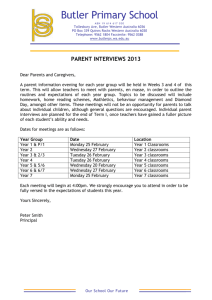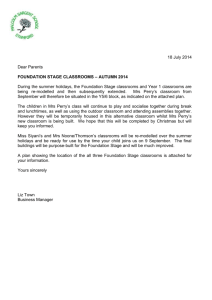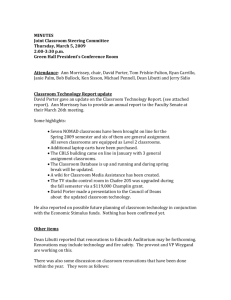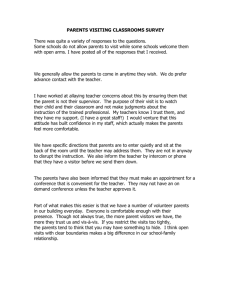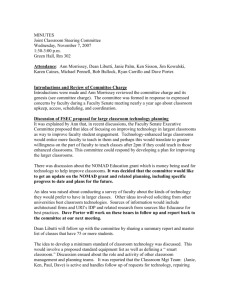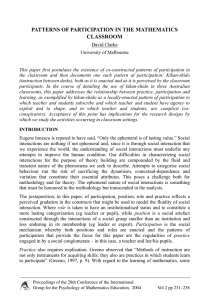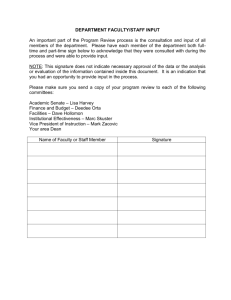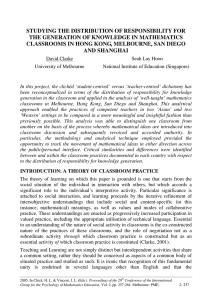Graduation address - University of Melbourne
advertisement
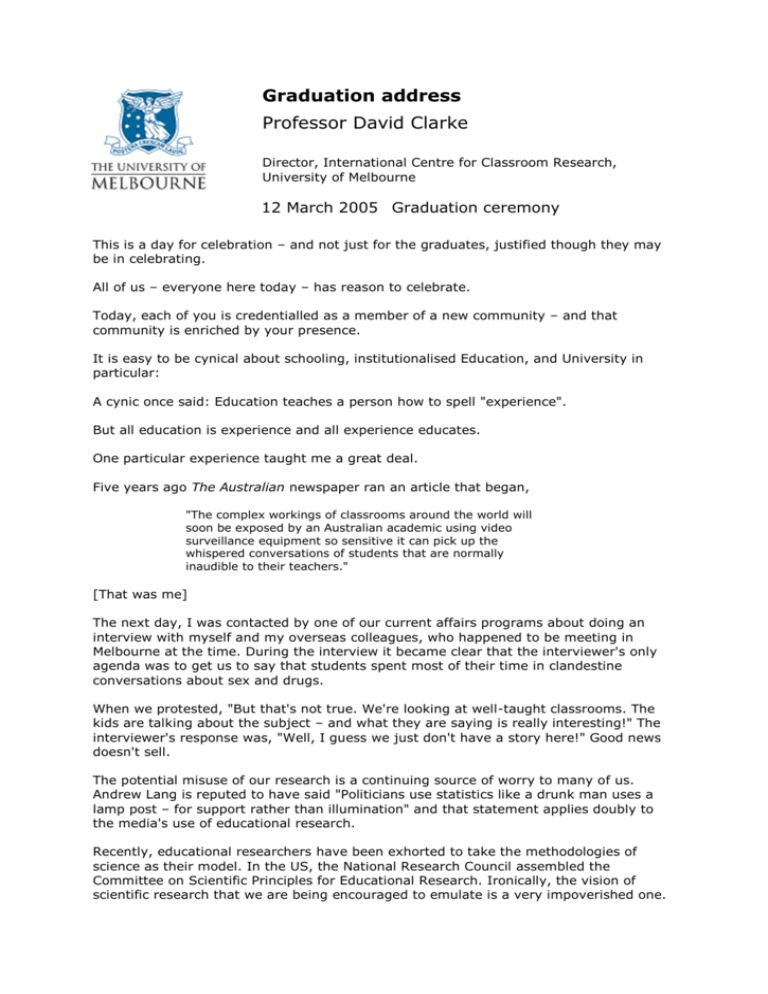
Graduation address Professor David Clarke Director, International Centre for Classroom Research, University of Melbourne 12 March 2005 Graduation ceremony This is a day for celebration – and not just for the graduates, justified though they may be in celebrating. All of us – everyone here today – has reason to celebrate. Today, each of you is credentialled as a member of a new community – and that community is enriched by your presence. It is easy to be cynical about schooling, institutionalised Education, and University in particular: A cynic once said: Education teaches a person how to spell "experience". But all education is experience and all experience educates. One particular experience taught me a great deal. Five years ago The Australian newspaper ran an article that began, "The complex workings of classrooms around the world will soon be exposed by an Australian academic using video surveillance equipment so sensitive it can pick up the whispered conversations of students that are normally inaudible to their teachers." [That was me] The next day, I was contacted by one of our current affairs programs about doing an interview with myself and my overseas colleagues, who happened to be meeting in Melbourne at the time. During the interview it became clear that the interviewer's only agenda was to get us to say that students spent most of their time in clandestine conversations about sex and drugs. When we protested, "But that's not true. We're looking at well-taught classrooms. The kids are talking about the subject – and what they are saying is really interesting!" The interviewer's response was, "Well, I guess we just don't have a story here!" Good news doesn't sell. The potential misuse of our research is a continuing source of worry to many of us. Andrew Lang is reputed to have said "Politicians use statistics like a drunk man uses a lamp post – for support rather than illumination" and that statement applies doubly to the media's use of educational research. Recently, educational researchers have been exhorted to take the methodologies of science as their model. In the US, the National Research Council assembled the Committee on Scientific Principles for Educational Research. Ironically, the vision of scientific research that we are being encouraged to emulate is a very impoverished one. Professor David Clarke Graduation address In my previous life as a physicist, one of my heroes was the Nobel prize-winner, Richard Feynman. Feynman defined science as "belief in the ignorance of authority" – this seems a very healthy position for a community of scholars to adopt – and I commend it to you. However, in the world of politics, to quote David Berliner, "facts are negotiable, but perceptions are rock solid." So the way we tell the stories of our research matters at least as much as the substantive findings. What has happened in the intervening five years since that interview? It has become increasingly evident the extent to which teaching and learning are cultural activities. Those of us who have the opportunity to look into classrooms in Shanghai and San Diego, Melbourne and Berlin, Tokyo and Tel Aviv are continually challenged to account for the startling differences AND the unexpected similarities that we find. Like our colleagues in the physical sciences, we are assisted by recent developments in technology. Our understanding of how learning occurs in classrooms has become more subtle and more complex as our tools for studying those classrooms have become more sophisticated. I'm lucky. I work with a community of researchers from a wonderfully diverse range of countries. The core of our work is the complex set of videotapes we make of classroom activity and the interviews that we conduct with the teacher and students after the lesson – where we hand them the remote control and say, "Play back the lesson. Fast forward through the unimportant bits, but play at normal speed the parts of the lesson that were important to you. Tell us what you were doing, thinking and feeling during those important moments." Now the Japanese have a name for everything – Japanese teachers have a rich vocabulary with which to talk about their professional activities. Every lesson is constructed around a climactic moment, called the Yamaba – and a Japanese teacher viewing a videotape of a lesson that they have just taught will always draw attention to this moment. So it was a little confronting for our Japanese colleagues to discover that many Japanese students were fast-forwarding through the Yamaba as though it wasn't there. What is a Yamaba for one person may not be a Yamaba for someone else. But it is an optimistic approach to teaching that accepts an obligation to provide a Yamaba for every student every lesson. I would like to think we might aspire to such optimism. To take another example: Our earlier research in Australian classrooms suggested that students learned most effectively when they were encouraged to discuss the content student to student. Now consider a classroom in Shanghai. Unlike an Australian classroom, students rarely ever talk directly to each other – classroom conversation is always mediated by the teacher. To Western eyes the classroom looked extremely teacher-centred, even old-fashioned. The activities that seemed most effective in Australia appeared almost completely absent - yet the students were clearly learning most effectively. Part of the explanation came in the interview after the lesson. The teacher said: "Don't teach them mechanically, don't teach them mechanically, let them brainstorm, enhance their flexibility." And, "I was not afraid that students had all sorts of questions. I just let them appear... Sometimes if you restrict them from doing this or that, their problems won't appear, right? But the problems will appear tomorrow, even if they didn't today, right?" University of Melbourne www.unimelb.edu.au/speeches/ Page 2 of 3 Professor David Clarke Graduation address This is an articulate summary of the heart of the contemporary reform agenda in Western education. But for cultural reasons the opportunities for student discussion of the content were provided in a teacher-led whole class approach. During one lesson, this same teacher said to the class, "Look at Shiqi's solution! This is much better than the usual method. Everyone copy this down." What was evident was a willingness to look for and celebrate the student's insight. We must pay our students the same respect. Australian classrooms are also sites for exemplary practice and the high level of interactivity in our classrooms and the subtle one-on-one strategies employed by our teachers are things of interest to educators in other countries. Children are also a source of significant insight. I have been eavesdropping on children in classrooms for many years now – as a teacher and as a researcher - and I am the richer for it: Here are three quick examples and I ask you to think about each of them: From a 7-year old boy: "The calculator doesn't actually do the sum for you – it just tells you the answer" From a Year 9 girl: "The answers you need aren't in the back of the book" And – when asked "How could we improve maths classes?" The advice of a 13 year-old boy was: "Have less work and more learning" I have the best job in the world – I get to tap into the wisdom of children and teachers from 14 countries – but many of you have a similar opportunity. Please make the most of it. In closing, can we all just pay tribute to the hard work that has brought you to this place at this time? John Donne said, "The knowledge that is got without pain is kept without pleasure" and it is interesting to reflect that the same statement could equally well have been said by Confucius. We don't apologise to you for the hard work. One of my honours students once said, "I've hated you all year... but I am so proud of this." Well, we hope you don't actually hate us too much. In fact, we hope you see this as the commencement of an on-going relationship. You are our partners in the field and we look forward to working with you in the future. We are here to celebrate – why else would we be dressed like this? We are here to celebrate your initiation into a new community - a community that has never been more diverse or more international in its membership – and a community that is greatly in need of your talents. So - we don't just say "Congratulations" - although congratulations are certainly in order - we say "Welcome". May your professional lives be ones with less work and more learning and may every day bring at least one Yamaba. Thank you. University of Melbourne www.unimelb.edu.au/speeches/ Page 3 of 3
